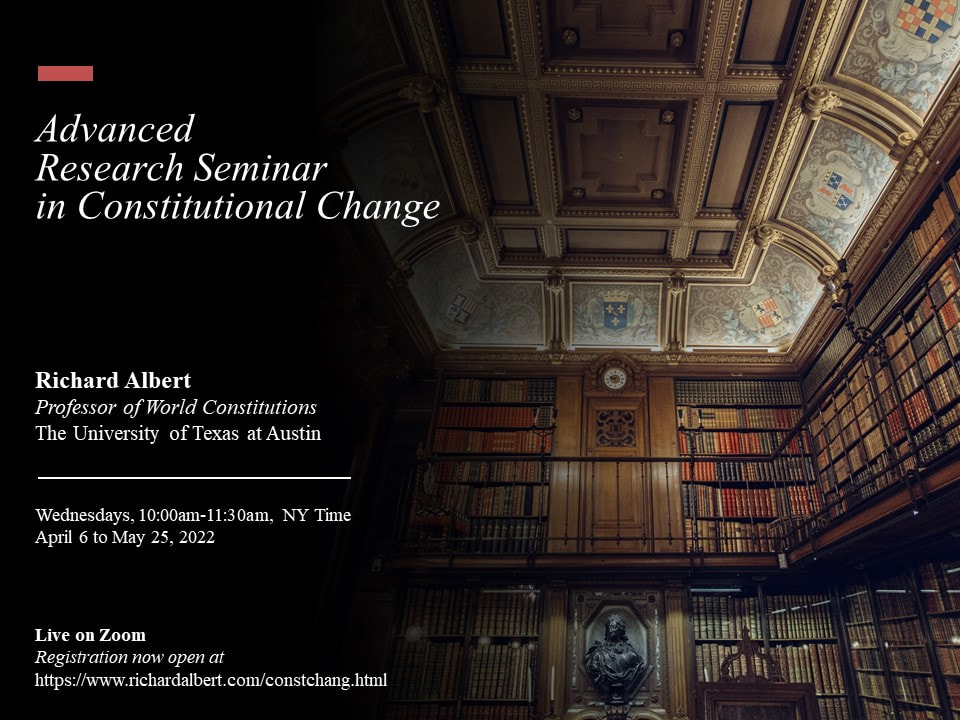The International Forum on the Future of Constitutionalism presents a new virtual course: "Advanced Research Seminar on Constitutional Change." In this course, registrants will have the opportunity (1) to learn about the theory and design of constitutional change; and (2) to suggest their paper or book manuscript (on any topic in constitutional change) to be read and discussed during the course.
This course will combine instructional and experiential components. The first half of the course will consist of lectures and discussion on all aspects of constitutional change. The second half of the course will be an opportunity to workshop a selected number of English-language manuscripts written by registrants on any subject in constitutional change, including constitutional amendment, constitutional dismemberment, constitutional interpretation, constitutional reform, and constitution-making.
The course will be taught by Richard Albert, William Stamps Farish Professor in Law, Professor of Government, and Director of Constitutional Studies at the University of Texas at Austin.
Topics covered in the first half of the course will include:
1. The life and death of constitutions
2. The design of constitutional reform procedures
3. Constitutional amendment versus constitutional dismemberment
4. The relationship between democracy and constitutional change
5. The uses and misuses of codification in constitutional change
Each session in the first half of the course will begin with remarks from Richard Albert, followed by an open discussion and debate involving course registrants. Readings will be circulated in advance.
The second half of the course will focus on a select number of manuscripts written by course registrants. Registrants will be invited in Week 2 of the course to submit their works-in-progress for consideration in Weeks 5 to 8 of the course. A select number of manuscripts will be chosen for presentation and discussion, with attention to diversity and representation across several factors, including subject-matter, geography, methodology, ethnicity, and seniority. We will circulate specific manuscripts in advance of each session and discuss these assigned manuscripts in detail. Each session in the second half of the course will begin with remarks from the author of the manuscript, followed by comments and discussion involving registrants. If necessary, we will welcome external speakers to present their works-in-progress in the field of constitutional change.
This eight-week course will be held live on Zoom on consecutive Wednesdays starting on April 6, 2022. Sessions will begin at 10:00am Toronto/NY time and end at 11:30am Toronto/NY time.
This course is open to all, including but not limited to faculty and students in law, government, history, world affairs, and other fields.
The deadline to enroll is Wednesday, March 30, 2022. The modest proceeds from this course will be used to cover some of the costs incurred in developing this course and also to fund educational initiatives for children in Haiti.
All registrants completing this course will receive a certification to that effect from the International Forum on the Future of Constitutionalism. No academic credit will be awarded in connection with this course.
Registration for this seminar will include registration at no cost for the Leaflet, an occasional newsletter on new scholarship and programs in constitutionalism.
This course will combine instructional and experiential components. The first half of the course will consist of lectures and discussion on all aspects of constitutional change. The second half of the course will be an opportunity to workshop a selected number of English-language manuscripts written by registrants on any subject in constitutional change, including constitutional amendment, constitutional dismemberment, constitutional interpretation, constitutional reform, and constitution-making.
The course will be taught by Richard Albert, William Stamps Farish Professor in Law, Professor of Government, and Director of Constitutional Studies at the University of Texas at Austin.
Topics covered in the first half of the course will include:
1. The life and death of constitutions
2. The design of constitutional reform procedures
3. Constitutional amendment versus constitutional dismemberment
4. The relationship between democracy and constitutional change
5. The uses and misuses of codification in constitutional change
Each session in the first half of the course will begin with remarks from Richard Albert, followed by an open discussion and debate involving course registrants. Readings will be circulated in advance.
The second half of the course will focus on a select number of manuscripts written by course registrants. Registrants will be invited in Week 2 of the course to submit their works-in-progress for consideration in Weeks 5 to 8 of the course. A select number of manuscripts will be chosen for presentation and discussion, with attention to diversity and representation across several factors, including subject-matter, geography, methodology, ethnicity, and seniority. We will circulate specific manuscripts in advance of each session and discuss these assigned manuscripts in detail. Each session in the second half of the course will begin with remarks from the author of the manuscript, followed by comments and discussion involving registrants. If necessary, we will welcome external speakers to present their works-in-progress in the field of constitutional change.
This eight-week course will be held live on Zoom on consecutive Wednesdays starting on April 6, 2022. Sessions will begin at 10:00am Toronto/NY time and end at 11:30am Toronto/NY time.
This course is open to all, including but not limited to faculty and students in law, government, history, world affairs, and other fields.
The deadline to enroll is Wednesday, March 30, 2022. The modest proceeds from this course will be used to cover some of the costs incurred in developing this course and also to fund educational initiatives for children in Haiti.
All registrants completing this course will receive a certification to that effect from the International Forum on the Future of Constitutionalism. No academic credit will be awarded in connection with this course.
Registration for this seminar will include registration at no cost for the Leaflet, an occasional newsletter on new scholarship and programs in constitutionalism.

